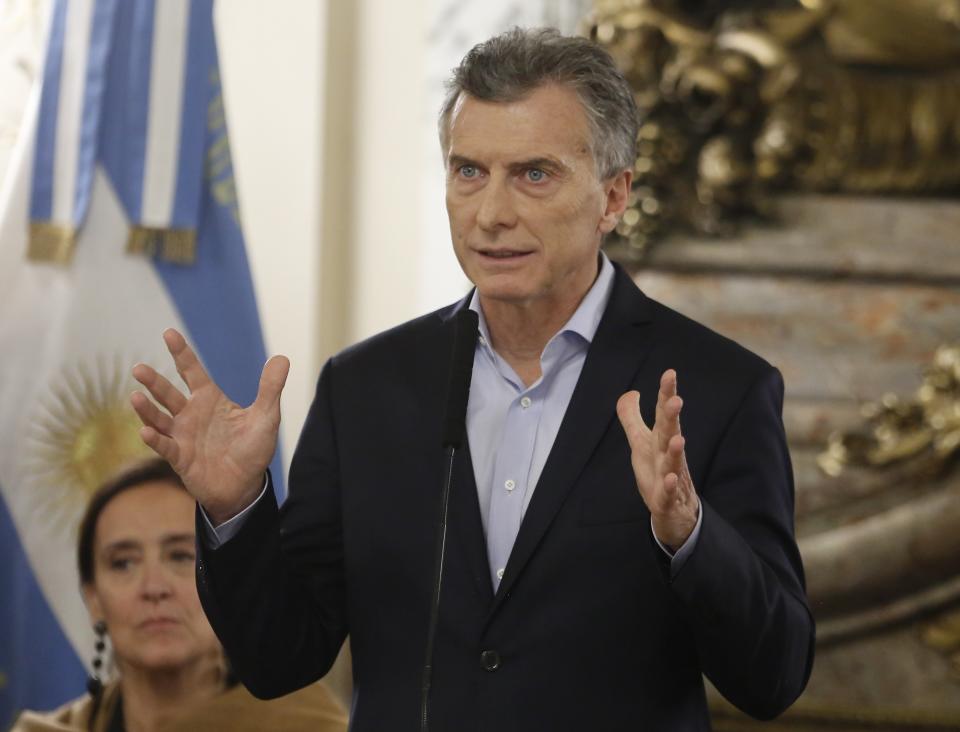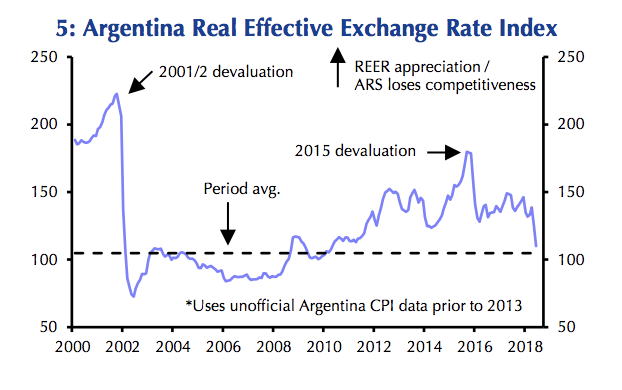The emerging markets feel-good story of the decade has imploded

For the past three years, Argentina has been the feel-good story of emerging markets. It was a tale of righting a ship taken horribly off course by protectionism, government intervention and market manipulation.
But that story looks all but over now.
President Mauricio Macri, after sweeping a wave of investment into the country with his election in 2015. He brought further inflows and a nearly 75% increase to the stock market after his political coalition increased its standing in parliament last year. But he’s now facing a crisis that threatens to wipe out the country’s recovery from recession and his presidency.
The country’s Merval stock index is down 31% year to date, in currency adjusted terms for dollar investors. Last week the country’s 100-year bond, issued just last year, fell to an all-time low of 79.49 cents on the dollar. Its peso currency, the country’s worst-performing asset, has sunk like a stone to 28 pesos per dollar, its lowest value against the greenback in history and lower by 75% than its value just a year ago.

The stunningly and persistently bad economic news has analysts worried that the country’s previous leaders, the Peronists and former President Cristina Fernandez de Kirchner, could be making a comeback.
“Argentina has a history of having economic turmoil turn into political issues and the fear for investors is that this can turn into protectionist policies,” said Asha Mehta, senior emerging markets portfolio manager at Acadian Asset Management in Boston. “Sentiment is still on [Macri’s] side … but things are changing.”
Mehta said she has been underweight Argentine stocks because of the market’s high valuations, but has recently added to positions as prices have come down.
What should have been a capstone achievement for Macri, MSCI’s decision to boost Argentina from a lowly frontier market to its emerging markets index, was mired in worry. In its announcement the index provider warned it would not hesitate to revoke Argentina’s EM membership should authorities “introduce any sort of market accessibility restrictions, such as capital or foreign exchange controls.”
‘It feels like the wheels have come off the wagon here,’
Things aren’t just bad for investors in Argentina. The country’s central bank raised interest rates to an astounding 40% recently to combat persistent inflation that remains in double digits. That’s making credit difficult to afford, dragging business creation and entrepreneurship that were central tenets of Macri’s campaign.
The president also has reduced subsidies for the poor and haggled with organized labor groups leading Argentina’s leading labor federation to announce plans to stage a one-day general strike next week.
“It feels like the wheels have come off the wagon here,” said an emerging markets fund manager at a major financial firm who invests in Argentina but was not authorized to discuss the country.
The investor said that while hedge funds have dumped their holdings of Argentine assets, particularly debt, in short order, asset managers who have to weight their holdings based on benchmarks such as the JPMorgan Global Diversified Index are stuck holding Argentina waiting for the bottom to appear.
“It’s really hard to go invest in Argentina unless you believe that Macri’s a two-term president,” the investor said. “This has been a political reform story where he supposedly had a strong mandate but the real economy is weakening and he’s losing popularity.”
Argentina: the canary in the coal mine
A hedge fund manager who also asked not to be named said he has dumped his fund’s holdings of Argentine debt.
While Macri’s approval ratings remain solid, there doesn’t appear to be much good news on the horizon. The country’s assets have continued their downward trajectory despite a $50 billion loan agreement reached with the International Monetary Fund earlier this month. The IMF is politically toxic in Argentina, blamed by many Argentines for the economic crisis it suffered in 2001.
Economics research firm Capital Economics sees Argentina falling back into recession soon, having just come out of a recession in the third quarter of 2016. They expect emerging markets as an asset class to struggle even more in 2018 and possibly worse in 2019 as the firm predicts the United States will see slowed economic growth as well.

Win Thin, global head of emerging market currency strategy at Brown Brothers Harriman, said Argentina’s woes can also be traced to the downturn in emerging markets assets overall this year as the Federal Reserve has begun raising U.S. overnight interest rates and the European Central Bank has announced the end of its massive bond buying program.
“Argentina was the canary in the coal mine, perhaps,” Thin said. “They were the most mispriced, and they really benefitted from zero [interest] rate policy and they’re probably going to suffer as that zero rate policy is unwound.”
Read more:
It’s the end of the world as we know it, and investors feel bullish
Would you invest in a company that sells $100 bottles of water?
Fund managers warn a downturn is coming and it’s ‘going to be ugly’
—
Dion Rabouin is a markets reporter for Yahoo Finance. Follow him on Twitter: @DionRabouin.
Follow Yahoo Finance on Facebook, Twitter, Instagram, and LinkedIn.

 Yahoo Finance
Yahoo Finance 